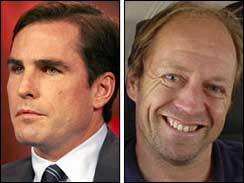
The best part of news often doesn't make it on TV or radio.
It's the give-and-take between colleagues off the air in the newsroom--the debate about stories, the people involved in them, and the things that get covered. It's when reporters' real-life feelings and biases play out before they pop on their 'neutral' suits and do their jobs.
So it was in January 2006 right after an IED took out ABC's Bob Woodruff and his photojournalist, Bob Vogt. As the networks gave hour by hour updates on their conditions, a particularly grumpy radio co-worker groused about how much pub Woodruff was getting "just because he's a reporter" and that "we aren't the story, the soldiers are". I disagreed silently (Woodruff is a reporter, but he's also a pretty well known person who a lot of people care about, thus making him newsworthy) and let him grumble.
I want to give said former colleague a call to see if he watched what Woodruff did with his situation the other night. His ABC special "To Iraq and Back" details not only his personal fight back from a brain injury but also the travails of ordinary grunts in the field who aren't getting the time of day from the government, the media, or those of us with the decals on the backs of our cars that read, "Support Our Troops."
Woodruff spent about half of his special talking about himself and Vogt--the attack, the aftermath, the effect on his family, the guilt he felt for what they'd gone through. There couldn't have been a dry eye in the house when his wife, on camera, recalls asking a doctor about what her injured husband would be like in the future, including the gut-wrenching query, "Will he still love me?"
Woodruff uses the rest of the hour to talk about the problems brain-injured soldiers face--some who fall between the V.A.'s tracks when they're sent home to government rehab facilities that aren't ready to deal with their unique brand of trauma. He tells of the overwhelming numbers of wounded the Feds are dealing with and paying for...about a V.A. that's been told not to come clean on just how many are getting hurt in Iraq. Why, he asks one veterans group leader, would the government want to keep that quiet? "Recruiting," he replies, the obvious implication being that the military doesn't bad news deterring anyone from signing up. War, sanitized for your protection.
As inspiring as the Woodruff story is, his revelations about others with similar injuries is infuriating...even more so whe added to revelations about Walter Reed Hospital and other V.A. facilities. It's time for all of us to do something more than wipe the road salt off our decals to make sure other motorists see that we "Support Our Troops". It's time to get pissed about how they've been treated from the start. Our government sent the troops overseas on the cheap--in numbers too small, minus the gear needed, sans the clarity of post-Saddam mission, and now apparently without the medical treatment and rehab they deserve.
The Woodruff special got so-so numbers--"Law and Order" won the hour, with "To Iraq and Back" tied for second with a "Criminal Minds" rerun on CBS. I wonder what they'd read like if all the folks with those ribbons stuck on the backs of their cars tuned in. TV offers lots of crap and we all use prime time as an escape. That said, serious journalism deserves a shout-out, especially to a network that could've gotten better Nielsens running a repeat of "Grey's Anatomy".
Woodruff probably doesn't know how much coverage he got after he got hurt in Iraq a year ago. Let's hope he gets more as he continues his journalistic crusade for those who are leaving parts of themselves on the battlefield. As for the rest of us: it's easy putting a sticker on a car. It's something else to live up to the slogan on it.
No comments:
Post a Comment